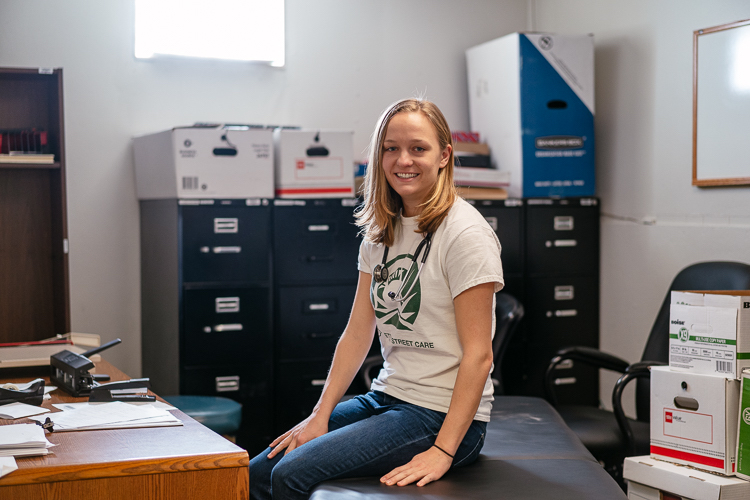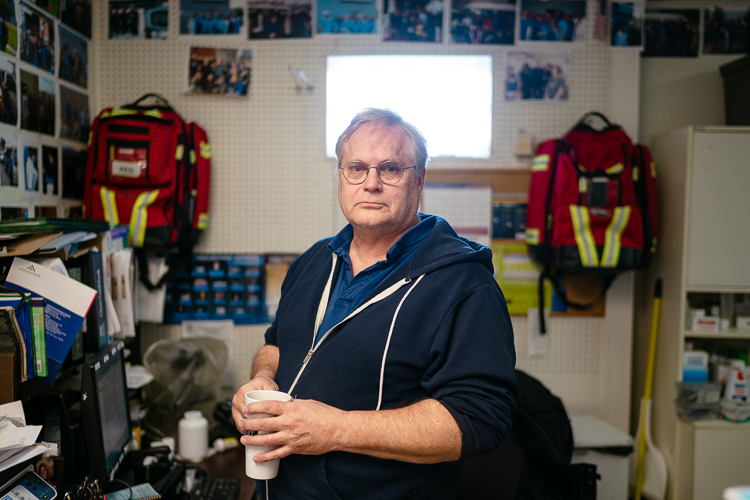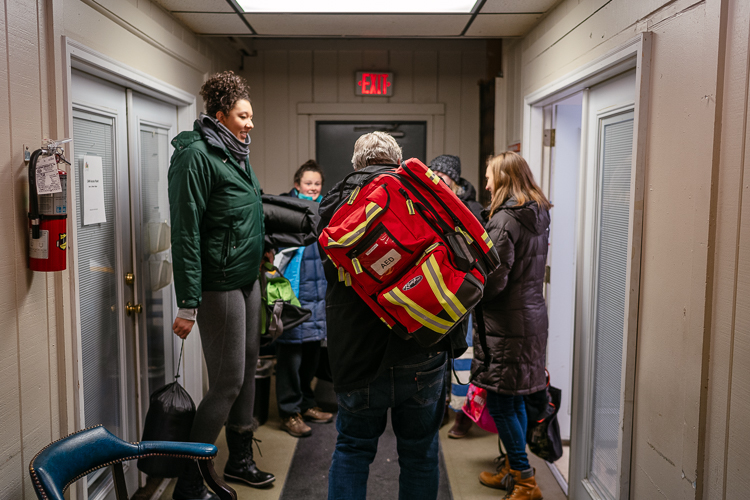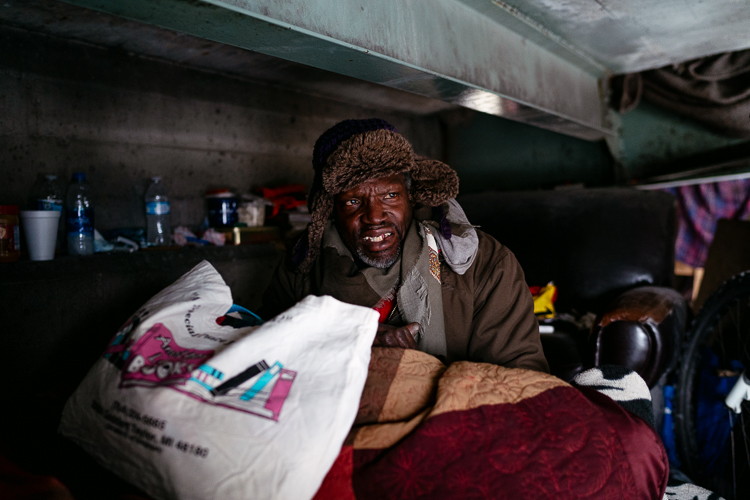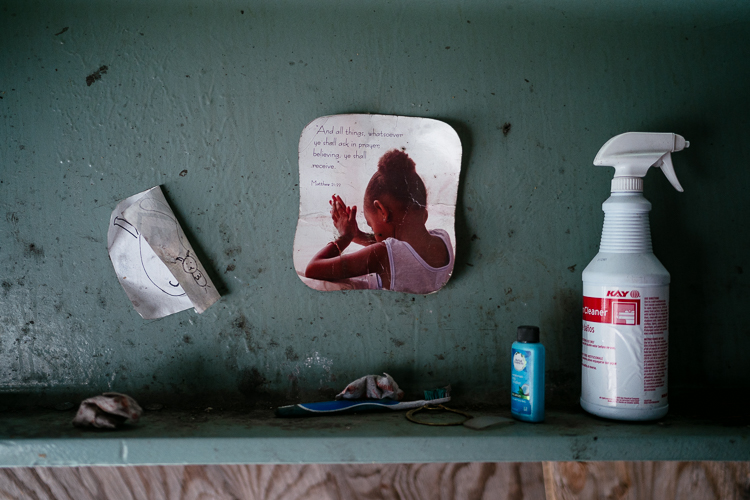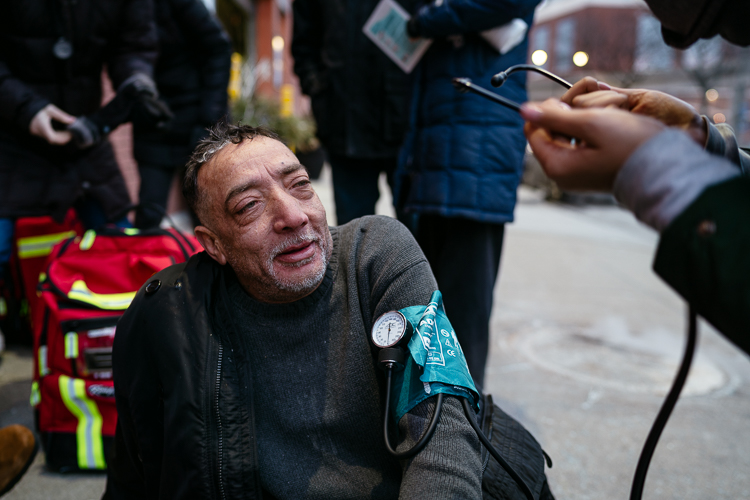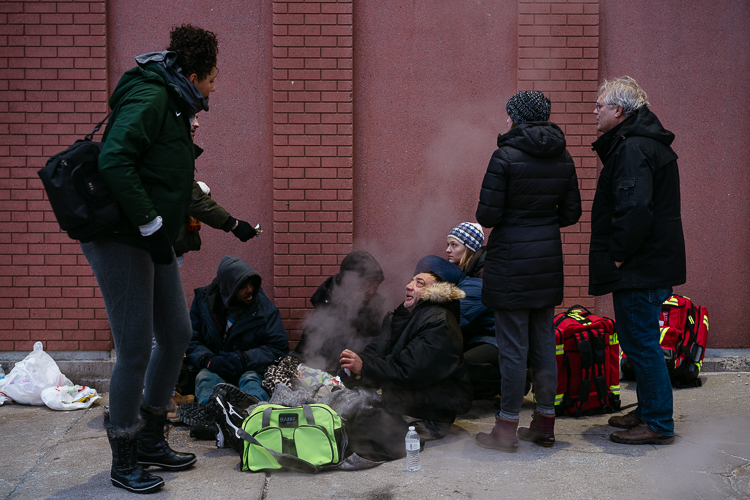Med students learn empathy and skills in Detroit street care programs
Two med school programs are helping students see past stereotypes by treating the homeless. In the process, the students themselves are engaging in a form of back-to-basics medicine that puts patients first.
In a back room of the NSO Tuamini Center — a 24 hour facility at Mack and 3rd Avenue that serves the homeless — a third-year medical student is helping a first-year student perform a neurological exam on a woman named Genovia who has been homeless for several months. She suffered a stroke in April and has had trouble with an infected sore on one leg, a condition that’s possibly been exacerbated by sleeping upright in her wheelchair.
The students spend over an hour with Genovia, going over her concerns and dressing her leg wound. “They try to get to know you,” Genovia says. “They try to get to make you feel comfortable. That’s the main thing.”
Genovia says she doesn’t always find this level of patience from doctors at other health clinics or in the emergency room. “They were very thorough … and they took their time.”
According to Dean Carpenter, a nurse practitioner at the NSO Tumaini Center, Detroit is an especially difficult place to be homeless. “That’s a point that I try to impress on the students,” he says. “They have an awesome responsibility of caring for the most medically fragile population in North America.”
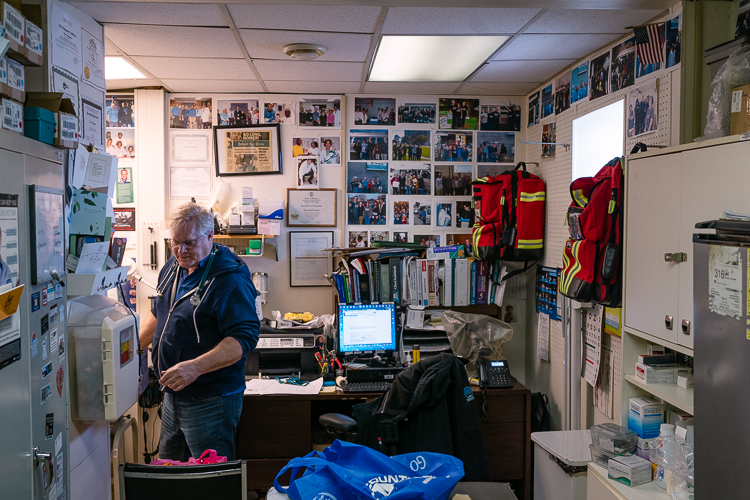
The reality of the situation, especially in the winter months, is that people in Detroit are losing toes to frostbite and getting burned from sleeping on steam vents as they try to stay warm. And the problems of being homeless are often further exacerbated by the assumptions made by health care professionals.
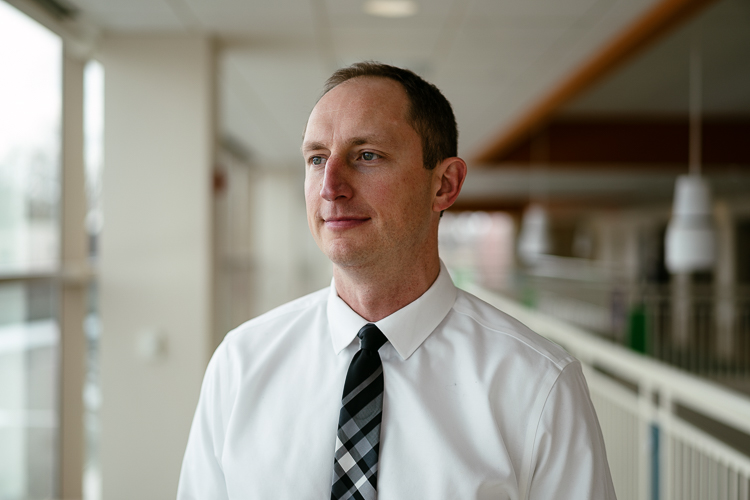
“Unfortunately, the stereotype of people that are homeless is that they’re trying to get something from you,” says Dr. Richard Bryce, an osteopath at Henry Ford Health System. “They’re drug addicts or alcoholics or whatever it is. And when you prejudge somebody like that, you’re not really helping them break whatever cycle it is that they’re stuck in.”
The Michigan State Medical School’s Detroit Street Care program and Wayne State University’s Street Medicine Detroit are helping medical students see past these stereotypes to build relationships between homeless people and medical professionals to improve their quality of care, put them in touch with other resources like housing, and overcome some of the structural problems that make being homeless in Detroit especially deadly. In the process, the students themselves are engaging in a form of back to basics medicine that puts patients first.
These programs allow medical students to reach out to homeless people on the street, carrying backpacks with medicine and diagnostic equipment, as well as necessities like hats, gloves, and food. They also meet with patients at places like the Tumaini Center, working under the tutelage of other medical students, nurse practitioners, and doctors. On the street, they go out with a “peer support specialist,” a formerly homeless person who helps them approach people.
The ability of medical students to treat people on the street or in a community center is limited. But students are able to act as a bridge to more comprehensive health care and other services like housing advocacy. (Both programs share an electronic database that allows them to input patient information on site and also research insurance eligibility and make appointments at the time of the visit.)
Students are often able to address immediate concerns and provide common medications. Perhaps the biggest benefit of the program, however, is establishing a connection that’s generally lacking in an emergency room visit.
“As you build that trust, they might be able to offer up a health concern or sign up to get housing or something further down the line,” says Allison Jennens, a medical student and president of Detroit Street Care. “But if you’re homeless, you’ve had a long history of broken trust and other unfortunate situations and they may be reluctant to ask for help.”
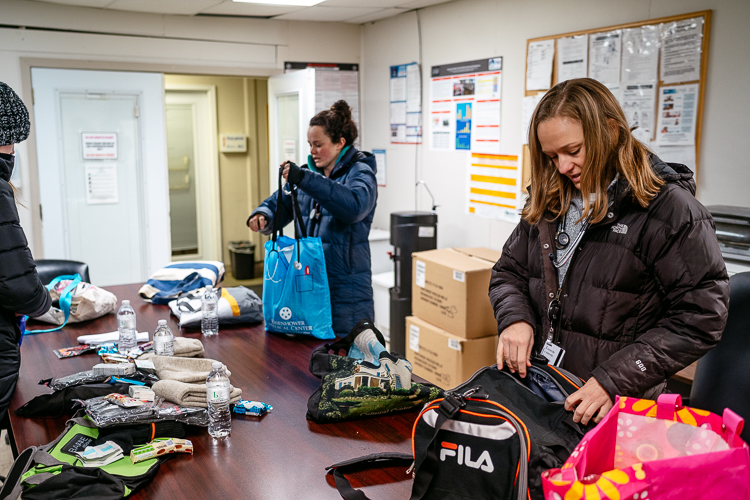
Carpenter helps coach students in how to interact with patients. “We try to match their posture. If they’re sitting, we’ll sit next to them. And just in general treat them with respect and be aware of their personal boundaries,” he says.
The medical students benefit from the program by getting to see a number of common ailments first hand, as well as less common conditions that come with the stresses of being homeless. But one of the fundamental benefits of the program is its focus on patient care.
“Doctors are trained in science, science, science,” Carpenter says. “That’s one of the reasons the founder advocated for the program. Because he wanted med students to be able to get back to basics of patient interaction and remembering why it is that they went into medicine.”
Some patients even take a certain pride in helping train the next generation of doctors, an idea that Genovia at the Tumaini center seconded. It also helps that medical students like Eliana Small, who’s also the incoming president of Detroit Street Care, have entered their training with an awareness of social determinants of health or the social and economic factors that influence health outcomes in groups or individuals.
Homelessness itself is a major factor in the conditions these doctors are treating. “It jut exacerbates every situation, every health issue they have,” Jennens says.
Although these teams try to put patients in touch with housing resources, they can’t cure homelessness itself and are up against sometimes harmful city policies like the recent eviction of homeless people from various encampments that left patients without necessary clothing and other protection from the elements.
Detroit also lacks the infrastructure that other cities have for providing health care to its poorest residents. Carpenter cites a study from 2010 that showed Detroit only had 22 Federally Qualified Health Centers (FQHCs) or similar organizations known as “look alikes” — which often serve as a safety net for those who cannot access care elsewhere — as opposed to 53 in Indianapolis or more than 120 in Chicago.
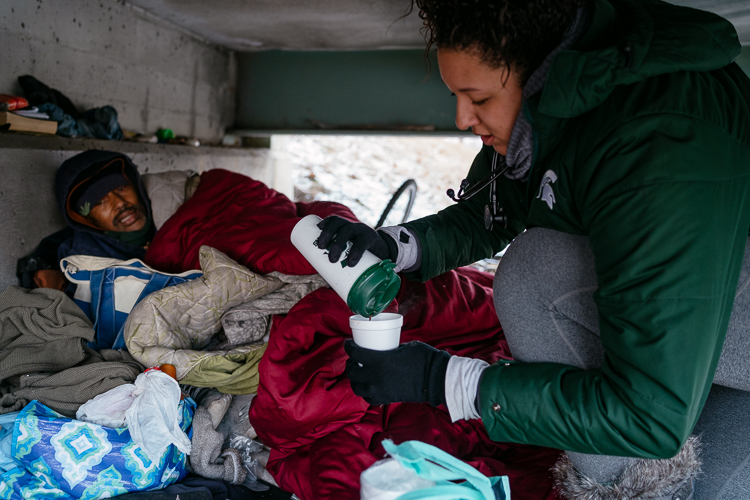
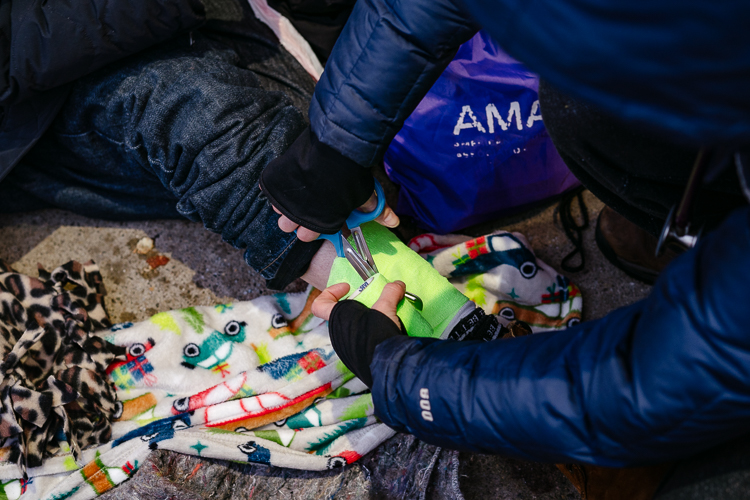
Detroit also lacks a public hospital. The lack of places to get care, along with the city’s cold winters and other factors, makes Detroit’s homeless population the most vulnerable of those surveyed in the study. Life expectancy for homeless people in Detroit is below the already low national average of 47 years.
Dr. Bryce says that one way to address these problems is with “housing first” policies for homeless people. This approach, which emphasizes getting people into housing before trying to solve other issues with substance abuse or mental health, has become increasingly popular.
“The pushback is always it costs money to house people and it’s true,” Dr. Bryce says. “But … what’s the long-term cost of somebody that’s homeless. Do they end up costing the system more money because they end up going to the emergency department for care that could have been prevented?”
Audrey, a patient at the Tumaini center who had recently become homeless for the first time, emphasized the toll that living on the street and being forced to sleep upright in the center’s chairs were taking on her.
“You’re used to handling your own business, going to your proper doctors and stuff,” she says. “And when these kind of changes happen like that, you’re stressed out. You see — we sleep in chairs. So our feet swell up and everything, especially if you’ve got fibro or rheumatoid.”
She says that when she gets her own place again, “I’ll be stable and I can rest right, shower right and eat right.” She was hoping to be back in housing by the end of the month.
This article is part of “Detroit Innovation,” a series highlighting community-led projects that are improving the vitality of neighborhoods in Detroit, while recognizing the potential of residents to work with partners to solve the most pressing challenges facing their communities.
The series is supported by the New Economy Initiative, a project of the Community Foundation for Southeast Michigan that’s working to create an inclusive, innovative regional culture.
Photos by Nick Hagen.
